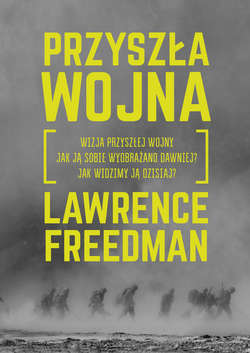Читать книгу Przyszła wojna - Lawrence Freedman - Страница 9
На сайте Литреса книга снята с продажи.
PRZYPISY
ОглавлениеPrzypisy do wstępu
1. Margaret Atwood, Morning in the Burned House, Nowy Jork: Houghton Mifflin, 1995.
2. John Gaddis, The Long Peace: Inquiries into the History of the Cold War, Londyn: Oxford University Press, 1989. Książka jest rozwinięciem artykułu Gaddisa The Long Peace: Elements of Stability in the Postwar International System, „International Security” 10.4 (1986).
3. John Keegan, A History of Warfare, Nowy Jork: Knopf, 1993, s. 59 [cyt. z wyd. pol. Historia wojen, przeł. G. Woźniak, Warszawa 1998, s. 70].
4. John Mueller, The Retreat from Doomsday: The Obsolescence of Major War, Nowy Jork: Basic Books, 1989, s. 13.
5. Steven Pinker, The Better Angels of Our Nature: Why Violence Has Declined, Londyn: Penguin Books, 2011 [wyd. pol. Zmierzch przemocy. Lepsza strona naszej natury, przeł. T. Bieroń, Poznań 2015].
6. Ibidem, s. 290–291 [cyt. z wyd. pol., s. 379–380].
7. Ibidem, s. 50.
8. Human Security Report Project, The Human Security Report 2013: The Decline in Global Violence: Evidence, Explanation, and Contestation, Vancouver: Human Security Press, 2013.
9. W opracowaniu brytyjskiego think tanku wojskowego z 2014 r. napisano, powołując się na Pinkera, że „częstość i intensywność wojen, a także liczba osób zmarłych gwałtowną śmiercią szybko się zmniejszają i najprawdopodobniej nadal będą się zmniejszać” (Ministry of Defence, Strategic Trends Programme: Global Strategic Trends – Out to 2045, Shrivenham: Doctrine, Concept and Development Center, 2014, s. 96). Podobne prognozy głosili: Frank Hoffman (Foresight into 21st Century Conflict: End of the Greatest Illusion, Filadelfia: Foreign Policy Research Institute, 2016), Joshua Goldstein (Winning the War: The Decline of Armed Conflict, Nowy Jork: Dutton, 2011) oraz Azar Gat (War in Human Civilization, Oxford: Oxford University Press, 2008; Is War Declining and Why? „Journal of Peace Research” 50.2. 2013). Zob. też pracę The Waning of Major War: Theories and Debates, red. Raimo Väyrynen, Londyn: Routledge, 2006, opublikowaną przed książką Pinkera. Dyskusję wywołaną teorią Pinkera omówiono w wielu artykułach, m.in. sam autor w tekście zamieszczonym w zbiorze pod red. Nilsa Pettera Gladischa: The Decline of War – The Main Issue, „International Studies Quarterly” 15.3 (2013). Tezy Pinkera bronili także Jesse Richards (The Secret Peace: Exposing the Positive Trend of World Events, Nowy Jork: Book & Ladder, 2010) oraz John Horgan (The End of War, San Francisco: McSweeney’ s. 2012).
10. Pinker, s. 361.
11. Ibidem, s. 672 [cyt. z wyd. pol., s. 853].
12. Pinker zapożyczył to określenie od Norberta Eliasa, który pisał o „procesie cywilizacyjnym” w dwutomowej książce opublikowanej po niemiecku w przededniu drugiej wojny światowej. Zob. Norbert Elias, The Civilizing Process: Sociogenetic and Psychogenetic Investigations, red. Eric Dunning i in., Malden, MA: Blackwell, 2000.
13. Pinker, s. 97.
14. Human Security Report, s. 37. Pinker oparł swoją tezę na żonglerce statystycznej i zapewne dlatego – świadom związanego z tym niebezpieczeństwa – przyznał, że niepewność zacytowanych danych może oznaczać, iż wojna ta rzeczywiście zakłóciła istniejącą tendencję. Należy więc rozumieć ją jako relikt, „ostatni przejaw dawnych czasów w powolnym procesie odchodzenia wielkiej wojny do historycznego lamusa” (Pinker, s. 107).
15. Tanisha M. Fazal, Dead Wrong? Battle Deaths, Military Medicine, and Exaggerated Report of War’s Demise, „International Security” 39.1 (2014), s. 95–125.
16. Carl Kaysen, Is War Obsolete? A Review Essay, „International Security” 14.4 (1990), s. 46–64.
17. Pinker, s. 291 [cyt. z wyd. pol., s. 379].
18. Pinker, s. 672 [cyt. z wyd. pol., s. 854].
19. Therese Pettersson, Peter Wallensteen, Armed Conflicts, 1946–2014, „Journal of Peace Research” 52.4 (2015), s. 536–540.
20. Håvard Hegre i in., Predicting Armed Conflict, 2010–2050, „International Studies Quarterly” 57 (2013), s. 250–270.
21. Daniel Bowden, The future of war is looking bleak, „Independent”, online, 22 listopada 2012. Dostępne pod adresem: http://www.independent.co.uk/news/world/politics/the-future-of-war-is-looking-bleak-8344462.html
22. John L. Comaroff, Paul C. Stern, New Perspectives on Nationalism and War, „Theory and Society” 23.1 (1994), s. 35.
